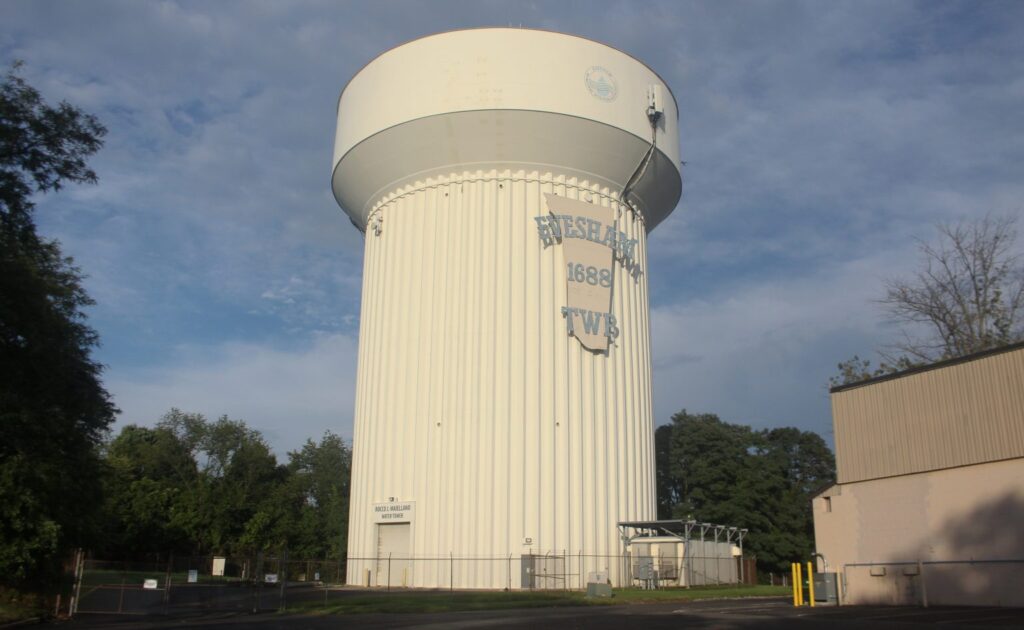South Jersey Information Equity Project: Where Does Your Drinking Water Come From Evesham, N.J.?

Photo by Ericka Heinrich.
By Erika Heinrich | South Jersey Information Equity Project
Editor’s Note: This is the first in a series of articles to educate readers in southwestern New Jersey about the source of their drinking water and its quality. This story was produced as part of the Center for Cooperative Media at Montclair State University’s South Jersey Information Equity Project fellowship and supported with funding from the Independence Public Media Foundation, the Geraldine R. Dodge Foundation and the NJ Civic Information Consortium.
Water quality has been a concern in various parts of the United States with problems such as bacteria levels, and so-called “forever chemicals,” as well as salt and lead.
In most cases, where problems are found, the quantity is usually small, but over time even small quantities can accumulate and cause serious health risks.
Many of these problems are known and water supply companies have to keep water safe by treating the drinking water to reach federal or state standards. Earlier this year, the U.S. Environmental Protection Agency tackled one of those problems and announced new limits for forever chemicals (PFAS/PFOS) as they pose a threat to everyone’s health.
Fortunately, in Evesham, N.J., the filtration system and water supply seem to be in good health.

Where does the drinking water come from?
In Evesham, the drinking water comes from groundwater.
Once the groundwater is located, the well pumps the water to the surface. Wells are drilled between 15 and 1,000 feet deep. These wells are connected to a Community Water System that gives the town its water year-round. This system is maintained by American Water of South Jersey and the Evesham Municipal Utilities Authority.
Wells are sources of water
In Evesham alone, there are about 2,200 wells located across the town. But how do we ensure these wells have good quality water?
The levels of inorganic chemicals, pesticides and PFAS differ from well to well.
Greg Rossi from American Water’s Delaware River Regional Water Treatment Plant in Delran said, “There are natural formations where the groundwater is taken from with varying characteristics. The ground might be very rocky, or the soil could be dense or porous… All of these factors can have an effect on water quality.”
A Consumer Confidence Report is published annually as a review of the town’s water system. These reports take into account the maximum limit of a substance in tap water, and measures the town’s wells to ensure those figures are being maintained.
How does the water become purified?
Once the water comes to the surface, it undergoes a treatment. Rossi explained,
“The basic steps for conventional treatment of surface water are coagulation, flocculation, clarification, filtration and disinfection,” he said. “Disinfection is an important step in making sure treated water is safe for consumption.”
Groundwater most commonly needs disinfection and filtration to be safe to consume.
On its website, the CDC explains the treatment of wells: disinfection of well water can be a physical process or chemical process to deactivate the contaminants and removed microorganisms. The chemical process involves inserting a safe amount of chemical disinfectant such as chlorine, ozone, or chlorine dioxide.
Filtration is when the water goes through a physical barrier to catch the contaminants. This can also be a chemical or biological process determined by choice of filtration.
You install a filter in a home where the cold-water supply enters the home’s water system. Additional filters can be placed in a refrigerator or showerhead. It is important to maintain these filters, to keep a consistent schedule on the replacement of water filters.
What should we look for?
Chemicals and other substances can come from runoff that can seep into the ground and infiltrate the groundwater — salt is especially a concern.
“We educate customers about using less sidewalk and driveway salt and also using more environmentally friendly types of salt,” Rossi explained. “Once snow and ice melt, excess salt can be carried to streams and storm drains or soak directly into the ground, and it can be harmful to aquatic life and drinking water supplies.”
The proper disposal of medicine (pharmaceutical waste) and technology (also known as e-waste) correctly also helps keep drinking water healthy.
Pharmaceutical waste occurs when people dispose of medicines in trash cans and toilets, as well as companies improperly disposing of expired medicines.
According to Daniel’s Medical Waste Management, “The emergence of growing numbers of pharmaceuticals are appearing not only in the environment, but in groundwater systems, as well as septic tank systems.”
Proper medicine disposal can be found at your county building, local pharmacy or grocery store.
When it comes to e-waste, according to ERI, improper disposal of technology consists of personal computers, batteries, mobile phones, printers and even disposable vapes containing heavy metals like chromium, lead, zinc and copper.
When electronics corrode, these metals can seep into the ground and can eventually reach groundwater. Yale Sustainability suggests recycling by donating unwanted technology to local organizations. Evesham Township also has a Public Works Yard that accepts all electronics and appliances.
What are some resources?
Every year, a Consumer Confidence Report is published as a review of the town’s water system. The Regulatory Compliance at the Evesham Municipal Utilities Authority states, “Under the Federal Safe Drinking Water Act (SDWA), all states were required to establish a Source Water Assessment Program (SWAP)…The SWAP’s purpose was to determine the public water system source’s susceptibility to regulated contaminants…”
These reports take into account the maximum limit of a substance in tap water, and measures the town’s wells to ensure those figures are being maintained. Every year, for Evesham, in the Consumer Confidence Report 2023, all of the wells are low in all contaminants!

American Water of South Jersey, which is the main distributor of drinking water in the surrounding areas, also has a Consumer Confidence Report of its wells.
There is no telling what the future can hold for the water quality. However, by reviewing your town’s Consumer Confidence Report yearly, and asking questions, you can become aware if there are any problems.
The Evesham Municipal Utilities Authority suggests that anyone who is interested in the water supply can visit New Jersey’s Water Watch website.
American Water’s Watershed Protection advises citizens to find non-toxic cleaning products for your home and when gardening; to limit asphalt use and plant native plants such as Purple Coneflower or Black-Eyed Susan.
In addition, residents can help in community cleanups to keep the water sources free from trash, which also helps the local wildlife.
Follow Us Today On:
Note from AC JosepH Media: If you like this story and others posted on Front Runner New Jersey.com, lend us a hand so we can keep producing articles like these for New Jersey and the world to see. Click on SUPPORT FRNJ and make a contribution that will go directly in making more stories like this available. Thank you for reading!







